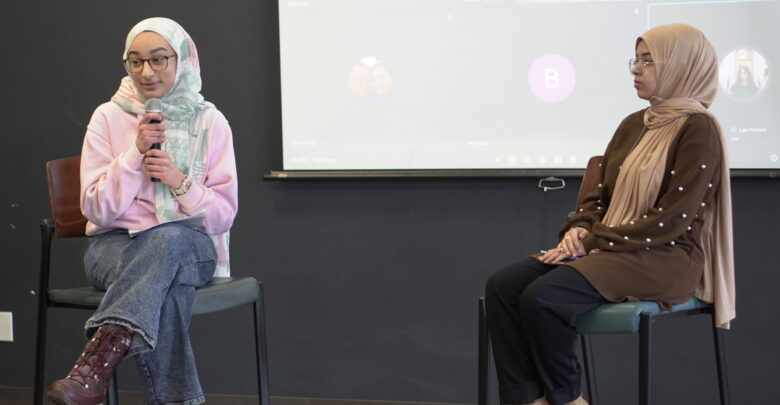 Lily Polenchuk
Lily PolenchukAt the Augustana and Campus Saint-Jean (CSJ) forum in the 2024 Students’ Union (SU) election, the vice president (academic) (VPA) candidates offered plenty of promises about creating academic change. Although their platforms share similar values, their approach to these issues set them apart.
Farah Elgaweesh had a stronger connection with the students of satellite campuses by directly addressing their concerns. Meanwhile, Layla Alhussainy’s answers were too general and seem disconnected from the student body. As a result, Elgaweesh has had a stronger campaign so far.
In the forums, Elgaweesh emphasized advocacy for academic consultations between North Campus and the satellite campuses. For Augustana, she aims to centralize academic opportunities so that students have the same opportunities as students in North Campus. This could look like student services such as CampusBridge, she said. As for CSJ, she intends to translate BearTracks to French to alleviate the burden placed on academic advisors. Elgaweesh noted that CSJ only has one academic advisor, showing she did her research ahead of time to understand the issues CSJ students face. Ensuring students’ voices are heard during decision-making is also important to her. By addressing these campus-specific issues, she has evidently connected with students to understand their needs.
Meanwhile, Alhussainy also said she would translate BearTracks into French, and also discussed the importance of academic integrity and accessibility in her platform. Her goals include making transportation accessible and expanding on fee affordability. She also plans to expand the Zero-Textbook Cost (ZTC) initiative, a project worked on by previous VPAs.
While this is important, she shouldn’t focus her campaign on these endeavors entirely, as a lot of work has already been done in these areas. While expanding already-existing initiatives and services is always good, her focus would be better-placed at directly addressing the needs of students.
Creating an inclusive learning environment is also important to her, which was emphasized at CSJ when she said she wants to create equality in academics. These are promising claims, however, there was no acknowledgement of the specific needs of Augustana and CSJ students. Each campus has different goals, and her platform should reflect this as well. If anything, her promises mean nothing if they do not address specific issues that students are actually concerned about.
At the Augustana forum, both candidates were only asked one question. When asked what strategies they would use to increase opportunities for experiential learning, both gave fairly straight-forward answers. Ultimately, Elgaweesh’s answer was stronger, as she reaffirmed her dedication to connecting with Augustana students and advocating for academic accessibility. She shared that Augustana students’ access to research opportunities shouldn’t be hindered by their location. Her solution was to consult with the Undergraduate Research Initiative (URI) and advocate for students. This demonstrates that Elgaweesh has done her best to understand Augustana students’ concerns.
In contrast, Alhussainy’s answer lacked connection to the specific concerns of Augustana students, or anything correlated to undergraduate research. She mentioned improved access to resources and services, but did not specify what should be improved. Ideally, a candidate should have an idea of what these resources and services are — Elgaweesh did, but Alhussainy didn’t. In addition, she suggested getting student representatives together to re-evaluate and advocate for students’ needs based on feedback. She also emphasized the importance of identifying and addressing the barriers to the academic success of students. However, her statements were too general and lacked specific connections to Augustana students, which weakened her points in comparison to Elgaweesh.
The promise of translating BearTracks to French has been made by many past candidates. At the CSJ forum, this year proved to be no exception. While Elgaweesh acknowledged this, she unreasonably suggested to use artificial intelligence (AI) to translate the website. Something that should be noted is that although AI has progressed a lot over the years, it isn’t perfect. In fact, AI translation is often inaccurate. Inaccurate translations will only create more barriers, since it’ll take time to fix these translation errors. Even though this isn’t an ideal answer, Elgaweesh’s AI idea shows that she was thinking of solutions.
Alhussainy did not address this concern with as specific of an idea, and rather discussed the accessibility of resources and making change in a timely manner. Unfortunately, she danced around the question, making her answer seem disconnected from CSJ students. While she shared a personal anecdote, explaining why this is an issue that’s important to her, her answers lacked clarity and she didn’t have an explicit solution.
While both candidates gave vague answers at the CSJ and Augustana forum, Elgaweesh’s answers demonstrated a stronger concern and commitment to students outside of North Campus. Elgaweesh clearly has the students of Augustana and CSJ in mind with her answers, and this has given her a strong step-up. On the contrary, Alhussainy encompasses the needs of students all throughout North Campus and the satellite campuses, but offers few ideas specific to Augustana and CSJ. This was disappointing, as now was the time to talk about issues specific to these campuses. Alhussainy still has work to do to if she wants to reach all students and their individual needs.




